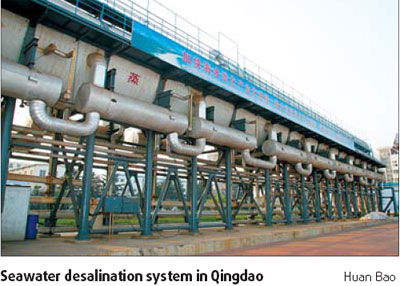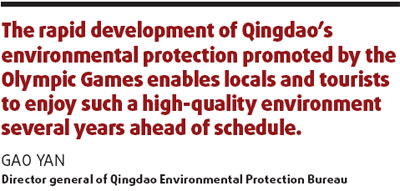Municipality reaches its own finish line
QINGDAO: Qingdao, the host city of 2008 Olympics sailing competition, has reached its own finish line set when Beijing sealed the bid for the Games seven years ago - to make the city an environmental showcase in China.

The city's environment has improved a lot over the past five years. From 2003 to 2007, the total investment on environmental protection was 32.8 billion yuan, the highest amount in the history.
"As the pollution index declines, the city's gross domestic product continues to increase 16 percent annually," Gao Yan, director general of Qingdao Environmental Protection Bureau told China Daily.
"The rapid development of Qingdao's environmental protection promoted by the Olympic Games enables locals and tourists to enjoy such a high-quality environment several years ahead of schedule," he added.
To guarantee environmental quality the city implemented 281 pollution control projects over the past five years, closing down 605 coal-burning boilers, and installing 66 sets of desulfurization equipment.
Combined with more stringent auto emission standards, the efforts have paid off - the number of days with good air quality rose by six days to 91.2 percent in 2007, up 1.9 percentage points over 2003.
The city also improved disposal and utilization of solid wastes like chromium, calcium carbide and alkaline slag produced by Qingdao chemical factories. They are now raw materials for the Qingdao and Huangdao Power Plants. Recycling and disposal of those byproducts solved a problem that has plagued the city for nearly 50 years.
Almost 6 million tons of industrial solid waste is produced in Qingdao annually, 97 percent of which is now reused or disposed of without polluting the environment. The safe disposal rate for medical waste is now 100 percent, compared to 40.4 percent in 2003.
Centralizing thousands of electroplating enterprises in an industrial park in Chengyang district now makes control and central disposal of their pollutants possible.
From 2003 to 2007, 127 key enterprises were forced to implement clean production technologies. Some 377 companies received ISO14001 certification on environmental management, while 50 enterprises began pilot recycling projects. The Qingdao Economic and Technological Development Area, which has the greatest number of industrial companies, has been listed as a ISO14000 national pilot zone.

The city also imposed barriers to new polluting companies, rejecting 730 projects between 2003 and 2007. A total of 647 cases of violating environmental laws were checked and administered.
More than 7 million yuan was invested to build an environmental monitoring and information system with 154 automated sampling sites in key districts and enterprises.
Samples found that 33 reservoirs and six drinking water supplies met potable water quality standards.
Offshore monitoring stations showed that seawater in 62.5 percent of stations met national Grade II quality standards, with marine stations at the Olympic sailing sites meeting the Grade I standard.
In the past five years, the city completed 13,300 hectares of new forestation, increasing forest cover to 35 percent, while 133 hectares of green space cover 40 percent of the city's jurisdiction.
The average noise level was sampled at 53.3 decibels, which meets Grade I standards for urban areas.
As well, 166 potential sources of radiation were safely moved out of Qingdao last year. Qingdao and its five county-level cities are all now listed as national model cities for environmental protection.
(China Daily 03/12/2008 page24)














